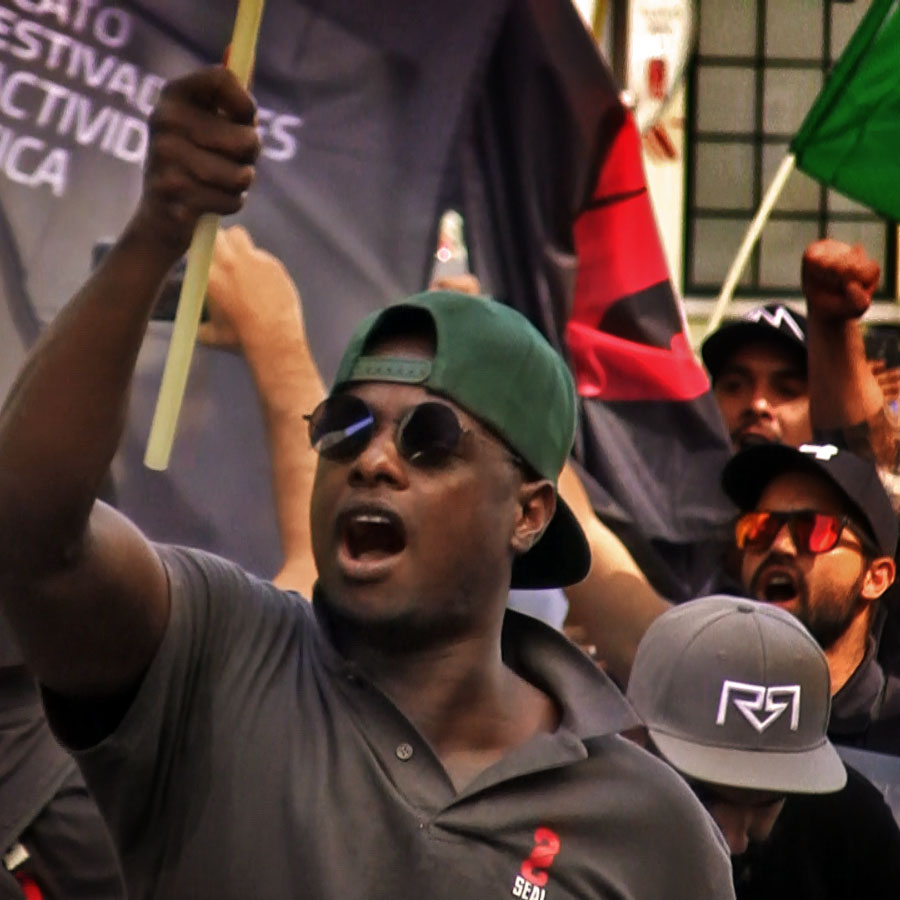Portugal // The long fight of the dockers~ 4 min

The SEAL union project of unifying port labor under its flag in order to guarantee dignified wages, work schedules and work conditions for all dockers and logistics workers in national ports has once again brought dockers to the streets of Lisbon.
Some of the main chants heard during the protest were “The docker is back”, “Your mother is the one who earns 5.000€” (due to the widespread media disinformation campaign which propagated false claims of dockers’ abnormally high wages), “I don’t want to be precarious”.
A pre-demonstration plenary ratified the decision to continue the dockers’ strike on supplemental labor. The main reasons for the unions’ continuation of the strike and for calling the demonstration were:
- The wages of SEAL members have been cut in half in the Leixões and Caniçal ports while the members of local unions have received wage increases and been shown preference in the allocation of supplemental labor.
- Two hundred precarious workers have been hired in Leixões via a temporary work company in order to occupy supplemental labor and thus deny it to SEAL members, who are currently making less money than the temps.
- For over a year now that non docker workers belonging to companies and services owned by port operators and shareholders of the Caniçal port are performing the supplemental work of SEAL members (and only SEAL members).
- There are “temporary” workers in Setúbal who have worked there for over 23 years, performing more than 30 monthly shifts.
- Some ports have frozen salary progressions or carry different progression tables for the same kind of work.
- The legal limit of 250 hours of supplemental port labor are regularly ignored.
- Weekend and holiday labor is not being counted as supplemental labor, in violation of the Work Code.
- There is a practice in Leixões and Caniçal of negotiating collective work agreements with local unions controlled by the bosses. SEAL is then invited to co-sign these deals.
- The abusive use of minimal services by the government to force dockers to perform supplemental labor, precisely the kind the strike applies to.
Several of the speeches heard during the demonstration echoed these claims:
I’m not one of the oldest precarious dockers. We have dockers in our port with 22 years of precariousness. We don’t have a right to sick leave, we don’t have the right to holidays, we don’t have a right to anything. We are the dream employees of any boss. Just think if you wouldn’t like to have workers like these around? They work when there is work, when there is no work they go home and get zero. We will fight till the end, until there isn’t one precarious worker.
It’s very important for dockers from all ports of Europe to be here today. We know that our brothers from other countries will support us in case of need. Because the European governments and the companies want the Sines model and we won’t allow it. Not one step back!
In Leixões, from the moment we joined the national union, all supplemental work was taken from us. We were removed from our roles which we had carried out for ten to twelve years. We were specialized workers, we handled cranes. As of this moment, these workers are reduced to handling boxes, the dockers are the ones cleaning the docks. Just today we had a peculiar episode. The Leixões boss hired a cameraman to come here and film the Leixões crew and then present his video over there. We insisted on making a video for him over there, all together, so that he could see everyone’s face because what matters in all of this is for people not to be afraid, is for people to be united.
The dockers point to the laws governing port labor which were approved during the government of Passos Coelho as the reason for many of these abuses.
The protest traveled from Cais do Sodré to Parliament. Dockers from Spain, Belgium, Denmark and Slovenia were present. Guilhotina also accompanied the previous sui generis dockers’ demonstrations in 2012 and 2016.




